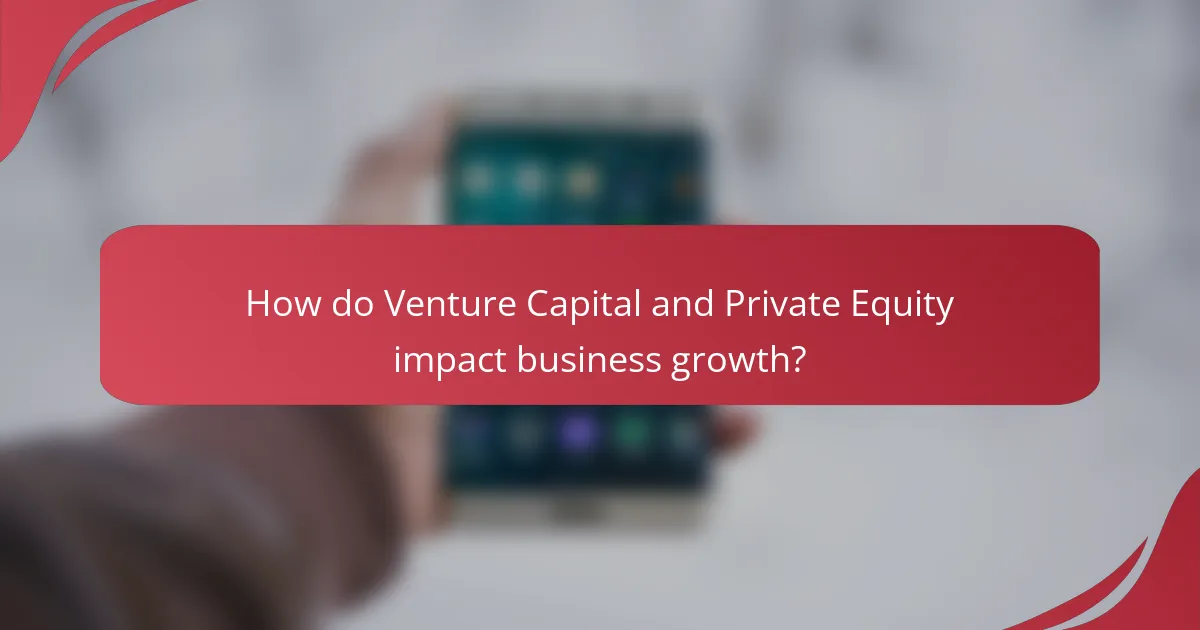Venture Capital (VC) and Private Equity (PE) are two distinct investment strategies that cater to different stages of business development. VC focuses on funding early-stage companies with high growth potential, while PE targets more mature businesses, often acquiring a controlling interest to drive strategic improvements. Understanding the nuances of each can help entrepreneurs and investors determine which approach aligns best with their goals and circumstances.

What are the key differences between Venture Capital and Private Equity?
Venture Capital (VC) and Private Equity (PE) are both forms of investment but differ significantly in their focus, structure, and strategies. VC typically invests in early-stage companies with high growth potential, while PE focuses on more mature businesses, often acquiring a controlling interest.
Investment stage focus
Venture Capital primarily targets startups and early-stage companies that are in the process of developing their products or services. These investments are made with the expectation of rapid growth and high returns, often in sectors like technology and biotechnology.
In contrast, Private Equity invests in established companies that are looking for capital to expand, restructure, or improve operations. These firms usually seek to acquire a significant or complete ownership stake, allowing them to influence management and strategic direction.
Ownership structure
In Venture Capital, investors usually take minority stakes in companies, allowing founders to retain control while benefiting from the capital and expertise of the VC firm. This structure encourages innovation and agility within the startup.
Private Equity firms, however, often acquire majority or complete ownership of the companies they invest in. This allows them to implement significant changes and drive strategic initiatives, but it may also lead to a more rigid management structure.
Investment size
Venture Capital investments typically range from hundreds of thousands to several million dollars, depending on the stage of the company and its growth potential. Early rounds may see smaller amounts, while later stages can attract larger sums as the company matures.
Private Equity investments are generally much larger, often in the tens of millions to billions of dollars. These substantial investments are aimed at acquiring significant stakes in established companies, which often require more capital for operational improvements or expansions.
Risk and return profile
Venture Capital investments carry a higher risk due to the nature of startups, with many failing to achieve profitability. However, successful VC investments can yield returns that far exceed those of traditional investments, often exceeding 20% annually.
Private Equity investments are considered less risky than VC, as they target established companies with proven business models. Returns in PE can also be substantial, typically ranging from 15% to 25%, depending on the success of the operational improvements made post-acquisition.
Management involvement
Venture Capitalists often take an active role in guiding startups, providing mentorship, strategic advice, and networking opportunities. Their involvement is crucial in helping young companies navigate challenges and scale effectively.
Private Equity firms tend to be more hands-on in management, often placing their own executives in key positions to drive change. This level of involvement can lead to significant operational shifts, but it may also create tension with existing management teams.

When should you choose Venture Capital?
Venture capital is ideal for startups and early-stage companies seeking significant funding to fuel growth. This type of financing is best suited for businesses that require substantial capital to scale quickly and are willing to share equity in exchange for investment.
Early-stage funding needs
Venture capital is particularly beneficial for early-stage companies that lack access to traditional financing options. These businesses often need funding to develop their products, expand their teams, and establish market presence. Venture capitalists typically invest in companies that are in the seed or Series A funding stages, providing the necessary capital to help them grow.
When seeking venture capital, it’s essential to have a solid business plan and a clear vision for growth. Investors will look for potential returns on their investment, so demonstrating a clear path to profitability is crucial.
High-growth potential
Companies with high-growth potential are prime candidates for venture capital. These businesses often operate in rapidly expanding markets or have innovative products that can disrupt existing industries. Venture capitalists are attracted to the possibility of significant returns, which can come from scaling operations quickly.
To attract venture capital, focus on showcasing your market opportunity and growth strategy. Highlighting key performance indicators (KPIs) such as user acquisition rates and revenue growth can help demonstrate your potential to investors.
Innovative business models
Venture capital is well-suited for companies with innovative business models that challenge the status quo. Investors are often looking for unique solutions or technologies that can create new markets or significantly improve existing ones. This innovation can be in various sectors, including technology, healthcare, and consumer products.
When presenting your business model to potential investors, emphasize what sets you apart from competitors. Clearly articulate your value proposition and how your innovation addresses a specific market need. This clarity can significantly enhance your chances of securing venture capital funding.

When should you choose Private Equity?
Private equity is best suited for investors looking to acquire established companies that require capital for growth, restructuring, or operational improvements. This investment approach typically involves taking a controlling interest in a business to implement strategic changes and enhance value over time.
Mature companies
Private equity is ideal for mature companies that have a stable revenue stream but may be underperforming or facing operational challenges. These businesses often require significant capital to innovate or expand, making them attractive targets for private equity firms.
Investors should assess the company’s financial health, market position, and potential for growth before proceeding. A thorough due diligence process can reveal opportunities for enhancement that align with the firm’s investment strategy.
Operational improvements
Private equity investments often focus on operational improvements to boost efficiency and profitability. This can involve streamlining processes, reducing costs, or enhancing product offerings to better meet market demands.
Investors should prioritize companies with clear areas for operational enhancement. Implementing best practices and leveraging industry expertise can lead to significant value creation, often resulting in higher returns upon exit.
Buyouts and restructuring
Buyouts and restructuring are common strategies in private equity, where firms acquire companies to implement significant changes. This may include management buyouts, where existing management takes control, or turnaround strategies for distressed businesses.
When considering a buyout, evaluate the company’s existing debt levels and operational challenges. A well-structured plan for restructuring can help stabilize the business and position it for future growth, ultimately increasing its market value.

How do Venture Capital and Private Equity impact business growth?
Venture Capital (VC) and Private Equity (PE) both play significant roles in driving business growth, but they do so in different ways. VC typically focuses on early-stage companies with high growth potential, while PE invests in more mature businesses, often seeking to improve operational efficiency and profitability.
Funding for innovation
Venture Capital is crucial for funding innovation, especially in technology and biotech sectors. VCs provide capital to startups that may not yet have a proven business model but possess innovative ideas that could disrupt markets. This funding often comes in exchange for equity, allowing investors to share in the potential upside as the company grows.
In contrast, Private Equity tends to invest in established companies that have a track record of revenue and profitability. While PE firms may support innovation, their primary focus is on enhancing existing operations and scaling businesses that are already generating cash flow. This often involves restructuring or implementing new strategies to drive growth.
Scalability and market expansion
Venture Capital is particularly well-suited for businesses aiming for rapid scalability. Startups that receive VC funding can quickly expand their operations, enter new markets, and hire talent to support growth. This is essential in competitive industries where speed to market can determine success.
Private Equity, on the other hand, typically looks for opportunities to scale mature businesses through strategic acquisitions or operational improvements. PE firms often have the resources to invest in technology upgrades or market expansion initiatives, which can significantly enhance a company’s market position. However, the growth may be more gradual compared to the explosive potential seen in VC-backed startups.

What are the risks associated with Venture Capital and Private Equity?
Venture capital and private equity both carry significant risks that investors must understand. These risks include market volatility, the potential for investment loss, and liquidity challenges that can affect the overall investment strategy.
Market volatility
Market volatility refers to the fluctuations in the value of investments due to various economic factors. Venture capital investments, often in early-stage companies, can be particularly sensitive to market changes, leading to rapid shifts in valuation. In contrast, private equity investments, which typically involve more mature companies, may experience less volatility but are still subject to economic downturns.
Investors should consider diversifying their portfolios to mitigate the impact of market volatility. A balanced approach that includes both venture capital and private equity can help manage risk while still pursuing growth opportunities.
Investment loss potential
Both venture capital and private equity investments carry a risk of loss, but the nature of these losses can differ. Venture capital investments often face a higher failure rate, with many startups not achieving profitability or going out of business. On the other hand, private equity investments may involve established companies that can still underperform due to poor management or market conditions.
Investors should conduct thorough due diligence before committing funds. Understanding the business model, market potential, and management team can help assess the likelihood of success and minimize the risk of investment loss.
Liquidity challenges
Liquidity challenges arise when investors cannot easily sell their investments or convert them into cash. Venture capital investments usually have longer lock-up periods, as they require time for startups to grow and mature before an exit can occur. Private equity investments also face liquidity issues, but they may offer more structured exit strategies, such as mergers or public offerings.
Investors should be prepared for these liquidity constraints and plan their cash flow accordingly. It is advisable to maintain a portion of liquid assets to cover immediate financial needs while investing in less liquid opportunities like venture capital and private equity.


